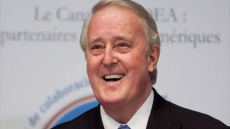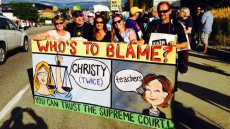NEWPORT, United Kingdom - Prime Minister Stephen Harper quietly bowed out of the NATO Summit on Friday, announcing a commitment of military advisers for Iraq but skipping a photo-op meant as a display of solidarity in the face of growing international threats in eastern Europe and the Middle East.
Other leaders joked and chatted as transport planes and a flight of fighter jets — including a Canadian CF-18 — swooped low over the rolling Welsh countryside in a demonstration of military precision meant as a signal to both a resurgent Russia and Islamic extremists.
Harper didn't attend, but instead sat down with a handful of his officials in the nearby meeting hall before the morning session, which was meant to put the finishing touches on NATO plans to respond to Russian aggression in Ukraine.
Before his departure, Harper announced the 30-day deployment of several dozen military advisers to Iraq to work with U.S. forces providing tactical guidance to Iraqi troops and Kurdish fighters battling the Islamic State in Iraq and the Levant, a brutal al-Qaida splinter group.
Those advisers are expected to be drawn from the Canadian Special Operations Regiment. Two Canadian military cargo planes are also ferrying weapons to the Kurds.
The prime minister said the new deployment is not without risk, but it's not a combat mission, something for which the Conservatives have traditionally sought the blessing of Parliament.
He also signalled very clearly that it's not the end of allied action, and that Canada would evaluate further participation as events unfold.
"The measures taken to date, particularly in the north of Iraq, have certainly been successful in halting the advance of ISIL and to some degree pushing back on it," Harper said. "But this is far from truly turning back the advance of ISIL or diminishing its long-term threat."
The allies are also considering further sanctions on Russia, which Canada fully supports, he added.
Despite being one of the harshest critics of President Vladimir Putin's actions, the prime minister was not part of a Thursday meeting with Ukrainian President Petro Poroshenko convened by the U.S., Britain, Germany, Italy and France.
Harper later met separately with Poroshenko, French President Francois Hollande and British Prime Minister David Cameron, whose opening remarks on Friday underlined another sore point, a call for NATO members to increase defence spending to a consistent level.
"We must increase capacity," Cameron said. "I hope today we can reaffirm our public commitment to spend two per cent of our GDP in defence and 20 per cent of that money on equipment. This will send a strong message to those who threaten us that our collective resolve is as strong as ever."
Harper resisted the call even before the summit, with his staff declaring it an "arbitrary target" while the prime minister told a British business audience that a nation should be measured by its contribution, not by how much it spends.
The defence budget will increase, as will the tempo of operations for the military, he said on Friday.
"I don't, in any area of government, set a budget and say we'll spend a certain amount and go out and try to spend it no matter how we can spend it," Harper said during his only question-and-answer session with Canadian journalists.
"That's not how we do business and I'm certainly not going spend on a massive military expansion for the sake of doing so. As I say, our allies can be assured and are assured that Canada will spend what is necessary."
NATO rolled out plans Friday to bolster its rapid reaction forces, which will be capable of deploying to countries under Russian threat within days. The alliance's military leaders are still working out the details, including a spearhead force of ultra-high readiness troops.
Harper made no immediate commitment to this effort, saying he has seen "very little in the way of detail." He said he wants to see plans take shape before deciding to spend money on them.





